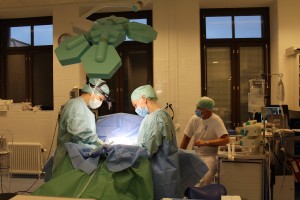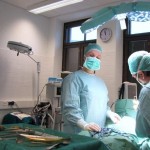General information
By treating the first signs of ageing at an early stage, aesthetic medicine can help you keep putting off the moment when you will need to undergo surgery.
Even so, in some cases, theatre is essential if we want to obtain the very best possible results, Although fortunately the vast majority of aesthetic surgical operations only require a very short stay at the clinic, and many of them can be performed on an outpatient basis, obviously this does not stop you from staying at City Clinic just for the pleasure of being pampered!
You should also be aware that, unlike aesthetic medicine procedures, surgical operations require the use of anaesthetic. We have now made such progress in this field that most aesthetic surgical operations can be performed under a partial anaesthetic, i.e. a local anaesthetic combined with controlled sedation. This helps to promote an immediate awakening, with an easy-to-manage recovery process and no nausea or vomiting.
We will gladly take the time to offer you a professional, extensive and realistic consultation. The first consultation at The City Clinic is always free and noncommittal. Contact us now.
Our surgery theather has 2 surgery rooms with best possible equipment that guarantee best possible result.
Consultation

The quality of the relationship built up with the surgeon is essential. In addition to being highly skilled at his or her job, the aesthetic surgeon needs to have a real ability to listen to patients. This will allow him or her to talk to the patient and decide on the bases for mutual trust which are essential to the success of any aesthetic surgical operation.
The first consultation will help you to get a better understanding of your motivations and to look at how appropriate they might be. In some cases it may even be a better idea not to undergo the surgery.
It will then be a matter of you and your aesthetic surgeon examining the cause of the imperfection which has brought you here and to look at the best way of putting it right. There are often a number of surgical techniques which can be used to deal with a given problem and sometimes gentler methods, from aesthetic medicine for example, can help to avoid or postpone surgery.
Once the indication has been established, the surgeon will explain all the details of the operation to you, together with result you can expect based, whenever possible, on result simulation software.
In cosmetic surgery, we often refer to the three distinct choices: local, IV or General Anesthesia.
At City Clinic we do everything to make sure you are safe and comfortable for your plastic surgery procedure. In fact, every year anesthesia is more and more safe. It is so safe, that it is riskier to drive a car than to have any type of anesthesia for any type of plastic surgery procedure such as rhinoplasty, breast augmentation, tummy-tuck, liposuction, or facelifts.
General anesthesia

Before you undergo general anesthesia, your anesthesiologist will talk with you and may ask questions about:
- Your health history
- Your prescription medications, over-the-counter medications and herbal supplements
- Allergies
- Your past experiences with anesthesia
The information you provide will help your anesthesiologist choose the medications that will be most appropriate and safe for you.
General anesthesia relaxes the muscles in your digestive tract and airway that keeps food and acid in your stomach and out of your lungs. That’s why it’s important to follow your doctor’s instructions about when to stop eating and drinking prior to surgery. In most cases, you should start fasting about six hours before your procedure. You may be able to drink fluids, such as coffee, until a few hours before your surgery.
Your doctor may tell you to take certain medications with a small sip of water during your fasting time. Discuss your medications with your doctor.
You may need to avoid some medications, such as aspirin and some other over-the-counter blood thinners, for at least a week before your procedure, as these can cause surgical complications.
Some vitamins and herbal remedies, such as ginseng, garlic, Ginkgo biloba, fish oil or others, may also keep your blood from clotting normally, interact with other medications or cause other complications. Discuss the types of dietary supplements you take with your doctor before your surgery.
If you have diabetes, talk with your doctor about altering your diabetes medication during the fasting period. Usually you won’t take oral diabetes medication the morning of your surgery, and if you take insulin your doctor may recommend a reduced dose.
If you have sleep apnea, discuss your condition with your doctor. The anesthesiologist or anesthetist will need to carefully watch and manage your breathing during and after your surgery.
During general anesthesia
General anesthesia makes you both unconscious and unable to feel pain during medical procedures.
The “sleep” you experience under general anesthesia is different from regular sleep. The anesthetized brain doesn’t respond to pain signals or surgical manipulations.
An anesthesiologist is a specially trained doctor who specializes in all types of anesthesia, including general anesthesia. After you’re asleep (unconscious), your body’s vital functions are monitored and your breathing is assisted and controlled.
After general anesthesia
When the surgery is complete, the anesthesia medications are discontinued, and you gradually awaken either in the operating room or the recovery room. You’ll probably feel groggy and a little confused when you first awaken.
- You may experience common side effects such as:
- Nausea
- Vomiting
- Dry mouth
- Sore throat
- Shivering
- Sleepiness
- Mild hoarseness
You may also experience other side effects after you awaken from anesthesia, such as pain. Side effects depend on your individual condition and the type of surgery. Your doctor may give you medications after your procedure to reduce pain and nausea.
After surgery

After any operation, you’ll have some side effects. There is usually some pain with surgery. There may also be swelling and soreness around the area that the surgeon cut. Your surgeon can tell you which side effects to expect.
Your surgeon can tell you how you might feel and what you will be able to do – or not do – the first few days, weeks, or months after surgery.
Some other questions to ask are:
- How long you will be in the hospital
- What kind of supplies, equipment, and help you might need when you go home
- When you can go back to work
- When it is ok to start exercising again
- Are they any other restrictions in your activities
Following your surgeon’s advice can help you recover as soon as possible.



















